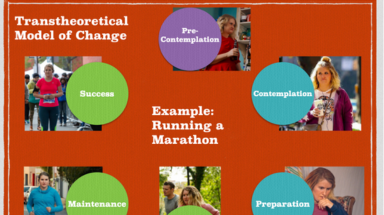What Is The Transtheoretical Model of Change?
The transtheoretical model of change (TMC), which was initially developed by Prochaska and DiClemente in 1992 is a well-researched and influential model, describing how people prepare to change their behaviour, and how successful change is maintained.
The model suggests that a coachee engaging with some form of behavioural change will progress through certain stages, as part of a cycle of change, although the individual’s movement through the stages may not be a straight path. Therefore, a coachee may not move straight from pre-contemplation on to maintenance, but may reach the maintenance stage, only to relapse to an earlier stage, or spiral back through the stages, before they eventually go on to achieve long-term maintenance.
The TMC suggests that people will experience different thinking patterns at the different stages of change, with an increased awareness, or new insight, about the possibility of change, occurring at the beginning of the contemplation stage, and a commitment to change occurring at the action and maintenance stages. The balance between the pros and cons of a particular behaviour may vary with a coachee’s stage of change. For example, a coachee in the contemplation stage might experience more negative thoughts and emotions towards their current behaviour, than a person in the action stage of change.

Using This Model Within Motivation Interviewing
Coachees may also vary in their motivation to change throughout the change cycle, so a coach’s approach will potentially need to flex as the coachee arrives at the different stages of the change cycle. A Motivational Interviewing (MI) approach is thought to be particularly useful to overcome ambivalence to change at the contemplation and preparation stages of change. Ambivalence has the potential to keep people stuck in their current unhelpful behaviour, and seemingly unable able to make changes, even though they are saying that they want to. From an MI perspective, ambivalence is to be expected as part of the change process and identifying and exploring barriers to change is a key component of this style of coaching.
Identifying and then amplifying the motivating factors behind the desire for change is important, as is recognising the emotional, psychological and practical barriers to change that might have to be worked on with the coachee in order for them to be overcome.
At the preparation stage the MI approach will move more towards a solution focused style of helping the coachee to plan for the action that they intend to take and this may continue into the maintenance stage if the coach continues to work with the coachee towards achieving the success in the behaviour change that they are looking for.
Another common stage for the coach and coachee to reengage with the TMC is if the coachee relapses at some point in the future. At this time they may seek further support to revisit their desired outcome and the challenges they’re facing in maintaining their motivation to change.




